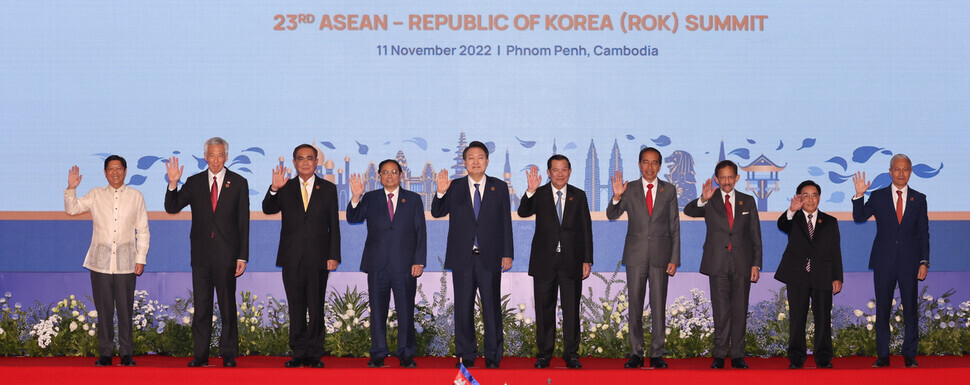hankyoreh
Links to other country sites 다른 나라 사이트 링크
[Editorial] Yoon’s Indo-Pacific strategy leans worryingly in favor of US

At a summit between South Korea and the Association of Southeast Asian Nations members on Friday, South Korean President Yoon Suk-yeol announced his administration’s “Indo-Pacific strategy.”
Given that past South Korean administrations had avoided even using the phrase “Indo-Pacific strategy” — in light of its associations with US efforts to curb China — this announcement was seen as a major shift in approach. Coming at a time when the confrontation between the US and China is becoming even more sharply defined, this sort of excessive US bias in our policy approach is a worrying development that could trigger objections from China, which is South Korea’s biggest single trade partner.
The Yoon administration’s Indo-Pacific strategy contains three main elements.
To begin with, it sets the key target of “strengthening a rule-based international order founded in universal values.” It’s a signal that Seoul intends to step up its partnership with countries that share our values, including an emphasis on freedom.
Second, it has the aim of boosting economic security by moving past South Korea’s overreliance on certain countries. Finally, it seeks to expand cooperation from existing economic and trade partnerships into the realm of security, including nuclear non-proliferation and maritime-related areas.
While the administration stated these principles in abstract terms, it’s impossible not to see the implications of keywords like “values” and “economic security” — namely that Seoul intends to take part in US-led efforts to rein in Beijing.
The idea of an “Indo-Pacific strategy” was first developed by the late former Japanese Prime Minister Shinzo Abe. The previous Donald Trump administration in the US got on board, and the current Joe Biden administration has been working to expand the vision.
The region in question accounts for 60% of the world’s gross domestic product (GDP) and over half of its maritime transportation. With the US actively pushing the region as a growth engine to take China’s place in the global economy, South Korea is in a position where it needs to expand its participation in economic and diplomatic terms.
But as the confrontation between Washington and Beijing intensifies, it is not the right approach for us to side too much with either one of them the way we are doing now. The countries caught in the middle of the “new Cold War system” may be finding themselves with ever less room to maneuver, but rather than simply following along with the bigger powers, they would be better off playing a role in mitigating or buffering the conflicts among them.
As an open trading power, South Korea should be demanding that both the US and China practice free trade and comply with international norms as much as possible. German Chancellor Olaf Scholz took a noteworthy step when he openly voiced his objections to these bloc-based confrontations during a recent visit to China.
With its New Southern and New Northern Policies, the administration of Yoon’s predecessor, Moon Jae-in, sought to strike a balance between sea-based and land-based powers. In contrast, there’s no sign of any strategy from the current administration on what kind of relationship it intends to establish with respect to land-based powers.
In a letter that he sent to Chinese President Xi Jinping in August, Yoon called for the two sides to “seek out new directions for cooperation based on a spirit of mutual respect.” Hopefully, he will work quickly to present a concrete game plan in this area.
Please direct questions or comments to [english@hani.co.kr]

Editorial・opinion
![[Column] When ‘fairness’ means hate and violence [Column] When ‘fairness’ means hate and violence](https://flexible.img.hani.co.kr/flexible/normal/500/300/imgdb/original/2024/0516/7417158465908824.jpg) [Column] When ‘fairness’ means hate and violence
[Column] When ‘fairness’ means hate and violence![[Editorial] Yoon must stop abusing authority to shield himself from investigation [Editorial] Yoon must stop abusing authority to shield himself from investigation](https://flexible.img.hani.co.kr/flexible/normal/500/300/imgdb/original/2024/0516/4417158464854198.jpg) [Editorial] Yoon must stop abusing authority to shield himself from investigation
[Editorial] Yoon must stop abusing authority to shield himself from investigation- [Column] US troop withdrawal from Korea could be the Acheson Line all over
- [Column] How to win back readers who’ve turned to YouTube for news
- [Column] Welcome to the president’s pity party
- [Editorial] Korea must respond firmly to Japan’s attempt to usurp Line
- [Editorial] Transfers of prosecutors investigating Korea’s first lady send chilling message
- [Column] Will Seoul’s ties with Moscow really recover on their own?
- [Column] Samsung’s ‘lost decade’ and Lee Jae-yong’s mismatched chopsticks
- [Correspondent’s column] The real reason the US is worried about Chinese ‘overcapacity’
Most viewed articles
- 1China calls US tariffs ‘madness,’ warns of full-on trade conflict
- 2[Column] US troop withdrawal from Korea could be the Acheson Line all over
- 3[Column] When ‘fairness’ means hate and violence
- 4Could Korea’s Naver lose control of Line to Japan?
- 5[Editorial] Yoon must stop abusing authority to shield himself from investigation
- 6Naver’s union calls for action from government over possible Japanese buyout of Line
- 7[Column] How to win back readers who’ve turned to YouTube for news
- 8[Column] Welcome to the president’s pity party
- 9DongA Ilbo and the government are told to apologize for past civil rights violations
- 10US has always pulled troops from Korea unilaterally — is Yoon prepared for it to happen again?